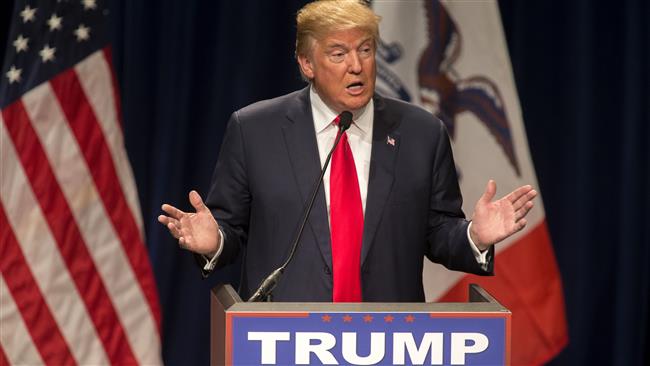
Trump’s Confusion over Iran Nuclear Deal: Compliance or Non-Compliance
TEHRAN(basirat): US President Donlad Trump still appears indecisive about how he will treat the 2015 nuclear deal, also known as the Joint Comprehensive Plan of Action (JCPOA), between Tehran and world powers. This behavior certainly stems from his confusion over the deal and also shows Trump’s reluctance to comply with the international accord.

Fakhreddin Asadi
Trump was sworn in as the 45th president of the United States on Friday, and
finally went to the White House. In their last days in the White House, the
officials of the Obama administration stressed the need for preserving the JCPOA
as a great achievement. US Secretary of State John Kerry, who had a key role in
the nuclear talks, warned Trump about irreversible consequences of withdrawing
from the deal.
"I’ll bet you — I haven’t talked to all of them, but I bet you that our friends
and allies who negotiated this with us will get together and that Russia, China,
Germany, France and Britain will say, ‘You know what? This is a good deal. We’re
going to keep it,’” Kerry said.
He further noted that US’s withdrawal from the multilateral deal will damage its
credibility in the world.
"We’ll have made ourselves the odd person out," Kerry said. "[And] we will have
done great injury to ourselves, and it will hurt for the endurance of one year,
two years, whatever, while the administration is that.”
In the meantime, while Trump was not mentioned by name, European officials
recently in a message aimed the US president emphasized that all parties to the
agreement should abide by it. Also, western media reports suggest that some
European officials have recently held talks with members of the Trump
administration over the JCPOA and its importance to be maintained. Trump and its
administration have made contradictory statements about the JCPOA and the US
compliance with the deal.
While Trump’s designated secretary of state Rex Tillerson has recommended a
"full review" of the nuclear deal, Defense Secretary James Mattis says US must
stick with accord. Furthermore, Trump’s recent remarks about the JCPOA show the
optimistic outlook that the new US government will implement the deal no longer
exists.
In an interview to the Times, Trump once said, "I’m not happy with the Iran
deal, I think it’s one of the worst deals ever made.” "Well I don’t want to say
what I’m gonna do with the Iran deal.”
It seems that European officials are worried about Trump’s unpredictable
approach toward the nuclear agreement. However, in the latest session of the
JCPOA joint commission in Vienna, representatives from Iran, the Group 5+1
(Russia, China, the US, Britain, France and Germany) and the European Union
adopted a tough approach to any potential violation of the JCPOA by the US. They
also expressed their concern over this issue and stressed the importance of
compliance with the accord by all parties.
US President Donlad Trump still appears indecisive about how he will treat the
2015 nuclear deal, also known as the Joint Comprehensive Plan of Action (JCPOA),
between Tehran and world powers. This behavior certainly stems from his
confusion over the deal and also shows Trump’s reluctance to comply with the
international accord endorsed by the UN security council. Consequently, it is
naïve to think that Washington could remain committed to the deal taking into
account what Tillerson and Mattis say about the JCPOA.
It should be noted here that Iran’s foreign policy and diplomacy system must
keep a wary eye on Trump administration’s multi-layered game on the JCPOA.
Recently, Donald Trump's Middle East adviser, Walid Phares, said, "…he [Trump]
is not going to implement it as is; he is going to revise it after negotiating
one on one with Iran or with a series of allies.”
New reports also suggest that the Trump administration is trying to impose new
sanctions on Iran over issues like its missile program and human rights
situation. Trump is seeking not to be the first one to violate the deal and also
impose new sanctions on the Islamic Republic and keep the previous one in their
place.
It is obvious that US lack of commitments to previous issues, including Iran’s
banking ties with other countries will continue and will be expedited when the
White House, the House of Representatives and the Senate are all the same front.
Therefore, new anti-Tehran sanctions are on the way.
The remarks by Mattis and Tillerson should not make Iran’s diplomacy system
hopeful and optimistic about the US, but such statements should consolidate
Tehran’s resistance against Washington’s lack of commitments.
The contradictory statements made by the two senior US officials reveal a new
duality in Trump's zigzagging ways on the JCPOA. In addition, imposing new
non-nuclear sanctions against Iran should not be overlooked, an issue which will
materialize not in the too distant future with the cooperation of the new
government and the Congress.
Anyway, a new principled measure should be adopted by the Islamic Republic
whereby it can announce the JCPOA null and void. In better words, Iran’s system
of diplomacy should be fully prepared to respond proportionately to any breach
of the JCPOA by the US. Iran’s Foreign Ministry ought to reiterate Iran’s
ability to fully restore its peaceful nuclear program.















